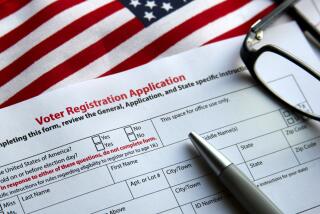Vote or pay: Controversial tactics for increasing voter turnout
- Share via
With a 24/7 news cycle focused heavily on politics, you’d think election day would bring out a bonanza of voters. With the exception of the 2008 presidential election, though, every polling place I’ve frequented has been a sleepy affair. On June 5, the California primary, there were five workers, plus me and my dog, in the room. Pathetic.
In its annual Ideas Report, the Atlantic proposes a solution: To increase voter turnout, abolish the secret ballot, writes Sasha Issenberg, who argues for a return to the public process we saw during the United States’ first century. Yeah, voting in plain view came with its own issues, namely corruption, but people came out to vote. Issenberg, author of the forthcoming book “The Victory Lab: The Secret Science of Winning Campaigns,” continues:
The most effective tool for turning nonvoters into voters -- 10 times better than the typical piece of preelection mail, according to a 2006 Michigan experiment -- is a threat to send neighbors evidence of one’s apathy. Other experiments have found gentler approaches that serve a similar function: merely reminding citizens that whether they cast a ballot is a matter of public record, or promising to print the names of those who do in a postelection newspaper ad, can boost turnout too. By introducing shame into the calculus of citizenship, the researchers behind these tests increased the psychological cost of not voting. In so doing, they restored the sense -- sadly lost for a century -- that voting ought to be not a personal act but a social one.
What could go wrong?
Peter Orszag, vice chairman of global banking at Citigroup Inc. and President Obama’s former budget director, agrees that we need to increase voter turnout, although he’d take a different approach. In a June 19 op-ed for Bloomberg View, he argues for mandatory voting: Those who fail to cast a ballot would have to pay a fine. Orszag makes his case:
Moving to compulsory voting would probably require a constitutional change and almost certainly would require the participation of both parties. It could be instituted only when it would not be of obvious benefit to one political party over another.
This brings us to the paradox of compulsory voting: It’s a sensible idea that could be enacted only when it would have almost no effect. In that case, some might wonder, why do it? The answer is that increased participation would make our democracy work better, in the sense of being more reflective of the population at large. And it could allow the first president in history to be elected by a majority of American adults.
But Los Angeles Times Op-Ed columnist Jonah Goldberg disagrees that we ought to encourage high voter turnouts. In fact, he writes in Tuesday’s Opinion pages, he’d like to make it harder to vote, thereby narrowing the voter pool.
It’s an unfashionable thing to say, but if anything, voting should be harder, not easier. Scarcity creates value. Sand is cheap because there’s so much of it. Gold is valuable because it is rare. If you want people to value their vote, we should make it more valuable. Personally, I wouldn’t mind tying eligibility to vote to passing the same citizenship test we require of immigrants. We might get fewer voters, but the voters would be far more likely to appreciate the solemnity of their ballots.
ALSO:
McManus: Romney’s ‘Mormon problem’
Rodriguez: New wave of immigrants -- a new target too?
L.A. teachers: Too stupid to be mad about not getting paid?
Join Alexandra Le Tellier on Twitter @alexletellier and Google+. Follow Opinion L.A. on Twitter and Facebook.
More to Read
A cure for the common opinion
Get thought-provoking perspectives with our weekly newsletter.
You may occasionally receive promotional content from the Los Angeles Times.









